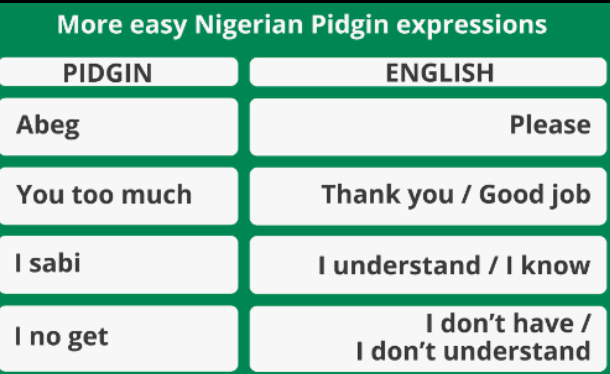Pidgin English in Nigeria is a bouquet of words and phrases coined majorly out of Queens English, along with several local languages and Portuguese. It was the first successful attempt to break the communication barrier between the 17th & 18th Century European pioneer explorers/traders, and various native tribes. As they encountered each tribe along the way, it became necessary to use simple words and phrases to create a simpler version of their language for quick comprehension. Today, we will find one form of pidgin English or another in every such nation.
Thus, the Pidgin English in Nigeria is just one amongst a vast collection of indigenous Creoles and pidgin English forms. They are spoken in countries along the West African Coast (Ghana, Sierra Leone, Liberia, Cameroun) and in the Caribbean nations. In Nigeria, Pidgin English is commonly referred to as ‘broken’ English.
The Origins of Pidgin English in Nigeria
It should not come as a surprise that many Portuguese words are commonplace in pidgin and Creole languages (as we shall soon see). Historically, the Portuguese were the first Europeans to ever set foot on Nigerian soil, and along the West Coast of Africa. They had direct contact with the Niger Delta people, and even had a fairly permanent settlement in Bini Kingdom. The interactions between the Portuguese and Bini people birthed what is today the widely adopted Nigerian pidgin. In fact, Nigerian pidgin was originally based on the Portuguese language.
And in the years following the eventual departure of the Portuguese from the Niger Delta region, the language persisted. The various tribes in the area (Itsekiri, Ijaw, Urhobo, Bini, Igbo, Isoko, Efik, Ibibio, etc.) continued using the Portuguese pidgin as a common language. It persisted up until the time the British forces arrived in the region. It subsequently encouraged the fusion of English with the Portuguese version of pidgin in later years.
The Socio-Cultural Importance of Pidgin English in Nigeria
To begin with, pidgin English has outlived the initial effort to establish western education in Nigeria and other European colonies. Again, it started out as the language of the unschooled – the common man of the streets, and traders. But Nigerian Pidgin English fast became a well-known lingua franca, embraced by so many people (especially the youths) over the decades. And for the simple reason that it is easy to learn, and enjoyable to speak – it is practically a humorous language.
Additionally, it has become a unifying language for thousands of Nigerians of all classes and ages. In fact, pidgin English experienced a quick adoption, and spread quite fast in the big cities and ports south of Nigeria (where it originated). These were (and still are) centers of big trade and rapid urbanization. Hordes of merchants and workers trooped to these city centers, and needed to interact and communicate easily. It became critical for such a language to continue to exist. And it has witnessed an evolution where several slangs and native words were injected into the informal vocabulary over the years.
Without Pidgin English, it would have been nearly impossible for people to adopt a common language. We are speaking of a densely-populated and multicultural complex called Nigeria, with well over 300 indigenous languages. Granted that standard Queen’s English is the official lingua franca of post-colonial Nigeria. But it has failed to address the strong yearning of people in each tribe to preserve their cultural heritage and identity.
The Popularity and Versatility of Pidgin English in Nigeria
Gone are the days when pidgin English in Nigeria was seen in a negative light by educated folks, as the language of the unlearned. Certain sources claim that at least 50 million people speak Nigerian Pidgin English as we speak.
To be candid, the use of pidgin English in Nigeria is now unbelievably widespread. It is used across the entire nation, from the North to South. The young and old; the educated, semi-literate and unschooled; people of all classes and tribes now speak Nigerian pidgin English. It has become one of the most important symbols of the Nigerian identity.
Furthermore, the zeal with which celebrities and influential people reach out to the Nigerian populace using pidgin English is phenomenal. The language has proven to be very effective in communicating with everyday people over mass media and social media; it is highly relatable. Scores of Nigerian influencers, broadcasters, journalists, actors and actresses, musicians, writers, merchants, and even politicians, are harnessing the humor, power, and reach of pidgin English.
It was the language of Afrobeat music and its legendary, globally renowned creator – Fela Anikulapo-Kuti. Perhaps that contributed to the popularity of the language over the years. For Fela, Afrobeat became the medium to demand for social justice and equity from the Nigerian government. He practically echoed the deep yearnings of the Nigerian people with his music.
A whole lot of content – whether informational, learning or entertainment; audio, video or written, are now produced in pidgin English. That also includes adverts and news. Two popular examples are popular Nigerian station, Wazobia FM News in pidgin; and BBC News Pidgin (launched in 2017).
Adopting Pidgin English in Nigeria as National Language: The Challenges
In spite of its neutral stance, no official status has been granted to Nigerian Pidgin English. That could be because pidgin English does not have a standard vocabulary, or rules of grammar and spelling. Yet it continues to evolve, incorporating words and slangs from several language sources (especially local languages).
Nevertheless, there are common words resident in the language that have stood the test of time. For instance, the word ‘sabi’ (which means ‘to know’ or ‘to know how to’) came out of the Portuguese word ‘saber’ with the same meaning. In later years, the English word ‘savvy’ was coined with that same meaning.
The pidgin word ‘pikin’ (or ‘pickaninny’ in standard English) originated from the Portuguese words ‘pequeno’ and ‘pequenino’ (both of them meaning ‘small’). Similar versions of these words also exist in other Creole languages. You will find examples such as the Nigerian pidgin word ‘chook’ (to stab or poke) in Bajan creole as ‘juk’; and ‘pikin’ is pronounced ‘pikney’ in islands like St. Vincent, Antigua and St. Kitts.
There are attempts by a few concerned establishments (such as the Naija Languej Akademi) to create a standard dictionary and reference guide for Nigerian pidgin English. The project was embarked upon as a collaboration between the French government (and its scholars) and West Africa.
The organizers of the above project believe that pidgin English could eventually evolve into a regional language across West Africa. And for the simple reason that similar versions of the original pidgin are now being spoken in many West African nations.
Additionally, a UNESCO study published about 4 decades ago revealed certain useful findings related to pidgin English. It was to the effect that children of primary school age were able to learn better when taught in their native/mother tongue. It is believed that pidgin English can equally contribute to improved learning abilities of these children, if adopted. But for that to happen, a standardization of pidgin English would be necessary.








